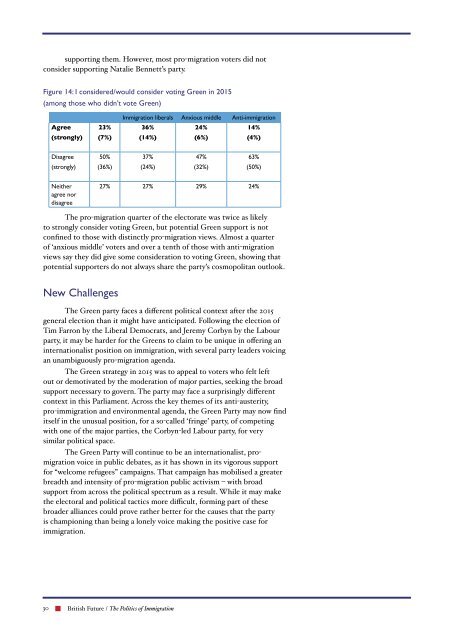THE POLITICS OF IMMIGRATION
The-politics-of-immigration
The-politics-of-immigration
You also want an ePaper? Increase the reach of your titles
YUMPU automatically turns print PDFs into web optimized ePapers that Google loves.
supporting them. However, most pro-migration voters did not<br />
consider supporting Natalie Bennett’s party.<br />
Figure 14: I considered/would consider voting Green in 2015<br />
(among those who didn’t vote Green)<br />
Agree<br />
(strongly)<br />
23%<br />
(7%)<br />
Immigration liberals Anxious middle Anti-immigration<br />
36%<br />
24%<br />
14%<br />
(14%)<br />
(6%)<br />
(4%)<br />
Disagree<br />
50%<br />
37%<br />
47%<br />
63%<br />
(strongly)<br />
(36%)<br />
(24%)<br />
(32%)<br />
(50%)<br />
Neither<br />
agree nor<br />
disagree<br />
27% 27% 29% 24%<br />
The pro-migration quarter of the electorate was twice as likely<br />
to strongly consider voting Green, but potential Green support is not<br />
confined to those with distinctly pro-migration views. Almost a quarter<br />
of ‘anxious middle’ voters and over a tenth of those with anti-migration<br />
views say they did give some consideration to voting Green, showing that<br />
potential supporters do not always share the party’s cosmopolitan outlook.<br />
New Challenges<br />
The Green party faces a different political context after the 2015<br />
general election than it might have anticipated. Following the election of<br />
Tim Farron by the Liberal Democrats, and Jeremy Corbyn by the Labour<br />
party, it may be harder for the Greens to claim to be unique in offering an<br />
internationalist position on immigration, with several party leaders voicing<br />
an unambiguously pro-migration agenda.<br />
The Green strategy in 2015 was to appeal to voters who felt left<br />
out or demotivated by the moderation of major parties, seeking the broad<br />
support necessary to govern. The party may face a surprisingly different<br />
context in this Parliament. Across the key themes of its anti-austerity,<br />
pro-immigration and environmental agenda, the Green Party may now find<br />
itself in the unusual position, for a so-called ‘fringe’ party, of competing<br />
with one of the major parties, the Corbyn-led Labour party, for very<br />
similar political space.<br />
The Green Party will continue to be an internationalist, promigration<br />
voice in public debates, as it has shown in its vigorous support<br />
for “welcome refugees” campaigns. That campaign has mobilised a greater<br />
breadth and intensity of pro-migration public activism – with broad<br />
support from across the political spectrum as a result. While it may make<br />
the electoral and political tactics more difficult, forming part of these<br />
broader alliances could prove rather better for the causes that the party<br />
is championing than being a lonely voice making the positive case for<br />
immigration.<br />
30 British Future / The Politics of Immigration


